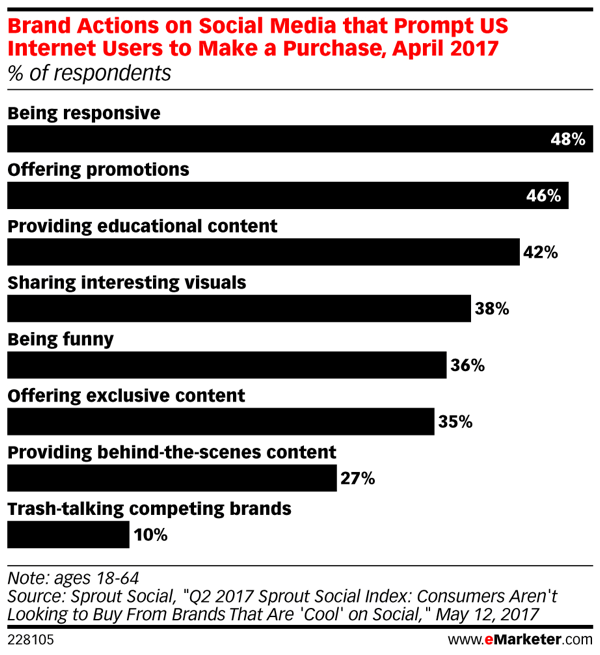Even though we read them, speak them and hear them almost non-stop, words are often an underrated component of a small business marketing plan. When used strategically, the right marketing power words cause people to take action. They click, open, buy and generate revenue for you.
When you use the wrong words, what happens? Nothing…and that’s the problem.
Communication always has an intention, whether it’s to inform, evoke an action such as to buy, strike an emotional chord or get a laugh. And we all know that nothing ruins a good joke like a misplaced punchline. Small business marketing requires the same attention.
When you’re telling a story to friends or family, you select your words deliberately. You unravel the story in a particular way, using a tone of voice and facial expressions to emphasize your words and paint a specific picture.
Bonus Content: Want to increase your email open rate? Download our Email Marketing Roadmap and make sure your emails are on the right track.
Are the words you’re choosing in business communication helping you reach your intended goal?
With a little planning, you can be sure they are. You can determine how your customers consume your content, as well as how they take action, through thoughtfully selected marketing power words.
1. Determine Your Channel and Intention
Before you start choosing words, it’s important to understand that the most impactful words in one medium, or on one social media channel for that matter, may not be as strong in another.
Words that lead customers to act, think or feel vary based on the ways in which they’re delivered. For that reason, consider the channel you’re planning to use in order to select the most appropriate and effective marketing power words.
- If you’re creating copy for your website…Then your goal should be clear, informative content that’s relevant and provides long-term benefits to your audience.
- If you’re planning your next email newsletter…Then you want to inspire action, beginning with a subject line that snags attention and leads to an open.
- If you’re looking to spark engagement via social media…Then you should draft tweets, LinkedIn and Facebook posts to promote your business or expertise.
You can even make a face-to-face with a potential client more successful by consciously selecting marketing power words that encourage the actions you want to see taken.
Though statistics show there’s significant overlap in impactful words across marketing channels, it’s easiest to approach word selection from the channel perspective.
Now it’s time to incorporate your marketing power words!
2. Review Your Web Copy
Crafting effective web copy comes down to identifying a distinct audience, voice, and goal. Most web content is intended for long-term reach, whether it’s via searches or sharing. It’s most successful when it’s clear and to the point.
Text incorporating “you” and “your” speaks directly to the reader, and that has a subconscious effect.
Pro tip: Be careful using these in subject lines. You may end up in a spam folder.
“Free,” “new” and “instantly” get readers’ attention and are particularly successful results-wise for a very basic reason— people don’t like to miss out. Take advantage of human nature and work these words into your web copy, but only when and where they really make sense.
Customers are more likely to take action when given a reason (and almost any reason at that), which explains the effectiveness of “because.” It gives customers motivation. (“Act quickly because this offer won’t last!”) That said, don’t stretch to put this word to use in web content; instead, be compelling for maximum effect.
3. Study Your Email Newsletter Subject Lines
The first thing your contact list sees when it comes to your email marketing efforts (other than your “from” name) is the subject line, so choose those words carefully. Did you know that roughly 69 percent of email recipients report email as spam based solely on the subject line?
A customer’s first or last name is the most successful power word you can use in a newsletter’s subject. In fact, personalized email campaigns improve click-through rates by about 14 percent, so embrace personalization when you can.
Similar to web copy, personal pronouns like “we” and “you” hold some weight when it comes to newsletter text.
Include a degree of exclusivity in your email subject line with terms like “invitation” and “introducing.” These touch on our desires to be a part of something.
Bonus Content: Want to increase your email open rate? Download our Email Marketing Roadmap and make sure your emails are on the right track.
4. Adapt to Changing Social Media
What words encourage engagement on social media? It’s no surprise to see that specific marketing power words are hard to pin down in this area simply because this channel is growing and changing at an exponential rate.
What works is regularly asking questions, which often induces responses, shares, and likes across platforms. Posts beginning with “what,” “when” and “how” naturally arouse feedback and give you an easy opportunity to engage with customers.
Check out this graphic from eMarketer:

“Educational content” is a top reason why people make a purchase from a brand that they follow. Keep this in mind as you create your posts. Educational content includes words like “learn,” “improve” and “discover” to spark curiosity.
Put these marketing power words to use when you’re sharing your expert knowledge and expanding your reach as an industry authority.
5. Don’t Forget About Direct Communication
One-on-one conversations with customers can sometimes be the most difficult, but there are some words that are better to use than others, particularly from a marketing perspective.
“Who,” “what,” “where,” “when” and “why” questions are more likely to elicit more thoughtful responses than “should” and “would.” If you’re looking to learn more about a customer’s needs or determine the reason for hesitation regarding a possible sale, for example, use these words to sniff it out through useful conversation.
Personal pronouns — particularly “you” and “we” — also hit high on the list of effectiveness. They exhibit a degree of closeness that customers often subconsciously translate into familiarity and comfort.
Power comes in fewer words, believe it or not, with customers trusting more when you speak less. Aim to speak for no more than 30 seconds on your side of a conversation and then sincerely listen.
Start Applying Marketing Power Words Today
Successful marketing campaigns for small businesses require more than spot-on presentations, eye-catching graphics, and a well-curated email list. Marketing power words are key.
Each marketing channel benefits from a distinctive approach to language. The actual words you choose—whether in an email subject line or a social media shout-out—can sway people. If you take the time to consider your channel, audience, and goal, you can harness marketing power words to propel your customers to action.
Maybe writing and words aren’t your thing. We get it; it’s not easy to come up with content every week. That’s where OutboundEngine comes in. We’ve helped more than 10,000 small businesses with their marketing. This includes everything from email marketing to social media marketing to gathering reviews. Request a free demo today and see all the ways we can help you see continued success.



![Better Email Etiquette Equals Better Marketing Results [16 Rules]](https://www.outboundengine.com/wp-content/uploads/shutterstock_411184843-1-400x250.jpg)

